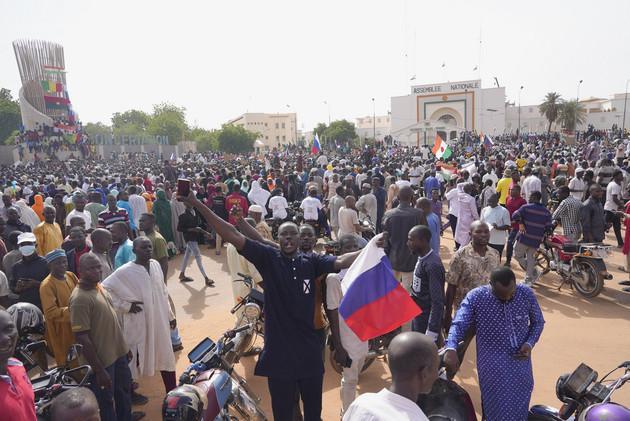Africa-Press – Malawi. Russian flags displayed during anti-France protests in West African nations have sparked fresh debates.
These protests, which have been going on since 2020, have resurfaced after the coup in Niger.
Protesters supporting coup regimes in former French colonies like Burkina Faso, Chad, and Mali have been waving Russian flags in the streets.
The most recent case happened during a show of strength by the junta regime in Niger’s capital, Niamey, on Aug. 6. In a stadium where thousands of Nigeriens gathered, the presence of Russian flags alongside the national flags caught attention.
However, African experts studying the region maintain that using Russian flags in protests related to demands for independence or anti-France sentiment is not appropriate.
“Using Russian flags in protests against France is not suitable,” Mali’s Bamako University lecturer Boubacar Amadou Cisse told Anadolu.
“The continent has shifted from slavery and colonialism to a new kind of colonization. Hence, Africans should avoid blindly affiliating with Russia.
“Despite not being widely known, France still maintains strong ties with its former colonies,” he said.
“France forces candidates into presidential roles in these nations, resulting in many African leaders maintaining power for years without confronting dictatorship and democracy gaps caused by France and the West. This trend explains recurrent coups and political instability, with protests showing the collapse of a French-backed system.”
Western and Russian rivalry in Africa is not recent
Stating that the Russia-West conflict in Africa is not recent, Cisse said: “After African states gained independence, the Soviet Union was among the first to recognize them and aided in their new development plans.”
“Some Africans see this as a shift from one master to another. Others view it as seeking help in a battle they can’t win alone. Both views have merit, but Russia, while lacking colonial ties, seeks to expand influence and protect interests in Africa,” he said.
“African people displaying Russian flags don’t create a positive image for the continent, and Russia shouldn’t be portrayed as its savior. True independence arises when we protect our land, feed our population, educate our youth, and offer them a promising future,” he said.
Russia infatuation might lead to disappointment
Ifeoluwa Siddiq Oyelami, known for his work on security and armed groups in West Africa, said that understanding the use of Russian flags in protests is complex, suggesting it signals dependence while talking about independence.
Oyelami, who supports Russia’s African policy as an alternative to the West, said that Africans often argue that “Russia didn’t enslave anyone” or “Russia didn’t establish colonies in Africa.”
“Recent uprisings, particularly in former French colonies, seem more like expressions of long-held grievances than genuine demands for independence. The Russia infatuation might lead to disappointment, and the protest currents could shift toward Russia as well,” he added.
Russian flags convey message to France
Moussa Hissein Moussa, founder of the Africa Thought Platform, said the use of Russian flags in protests is not preplanned.
“Russia is now France’s major rival. Displaying Russian flags might provoke France or convey the message that other global players exist,” he said.
“Africans should realize they can forge amicable ties, remain as allies, and collaborate with other nations when it aligns with their interests,” he added.
“In protests, waving foreign flags isn’t right. The Western media is highlighting this, implying Africans seek alignment with Russia. Africans are also signaling other powers to fill France’s void. Using Russia to remove France might be a short-term fix, but I think it’s the wrong approach,” he added.
For More News And Analysis About Malawi Follow Africa-Press






